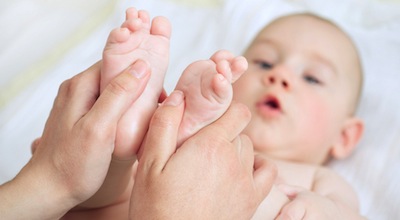How Infant Massage Certification Can Grow Your Massage Therapy Practice

Do you love babies and children? Have you ever thought of combining your massage skills with your interest in caring for kids? Infant and pediatric massage may be the specialty for you.
Why Infant and Pediatric Massage?
It’s no surprise that young children love to be touched.
“In fact, they thrive on it and it is a crucial part of their development. Children need physical contact for healthy growth and development. Nurturing touch promotes physiological, neurological and psychological development and function“ says author and educator Tina Allen in her ebook Pediatric Massage: A Massage Therapist’s Guide to Getting Started (available for free download through Massage Therapy Foundation).
There are many circumstances wherein children will not receive the necessary amount of touch in their lives for proper physical growth and emotional development. In such cases, a massage therapist with certification and experience in infant and pediatric massage may be able to provide services to these children.
Conditions and Circumstances
Children living with a variety of conditions, life circumstances can benefit from massage. Allen lists some of these conditions that may limit the amount of necessary touch a child receives:
- Institutional environments (hospitals, nursing homes, children’s homes)
- Medical conditions that make people afraid of touching the child (legitimate or imagined)
- A condition that makes untrained touch dangerous
- Neglect or abuse in the home
- Condition that makes the child averse to touch
Massage and Pre-term Infants
In a 2007 study, preterm infants exposed to daily stressors in the neonatal intensive care unit (NICU) showed reduced stress behaviors after massage therapy (December 2007 issue of Infant Behavior and Development). "Infants received three 15-min. massages administered at 9, 11 a.m. and 1 p.m. each day for five consecutive days. The massages were started on a Monday and ended on Friday of the same week, for a total of 15 massages.
The preterm infants received their massages from licensed massage therapists who were trained on a structured protocol." The study concluded that even after such limited exposure of only five days, preterm infants "showed fewer stress behaviors from the first to the last day," suggesting that the therapy "desensitizes the preterm infant to the stressful environment of the NICU, perhaps by enhancing longer periods of parasympathetic activity." The study also suggests that over time, massage therapy has a stress-reducing or "pacifying effect" to infants.
Opportunities to Grow Your Practice
In what ways can specializing in infant and pediatric massage grow your practice?
As with many specialties, a focus on infant and pediatric massage may open doors to new populations of clients and opportunities. This may include work inside your private practice or outside in other facilities, or even across the world:
Nursing homes - children with severe medical issues. Allen says “children who live in nursing homes, either special pediatric or general, are often those with the most severe medical issues. For this reason, it’s especially important to communicate frequently with the Director of Nursing in order to provide the safest, most appropriate care.”
Hospitals - opportunities for pediatric patients in a hospital include emotional support, rehabilitation, stress relief, and education for parents and caregivers.
Outpatient Clinics - opportunities for working alongside physical therapists for pediatric rehabilitation patients.
Home Visits - children feel safest at home, and this may be the best environment for children with anxiety or medical conditions that may prevent their mobility.
Community Service & Travel - a specialty in infant and pediatric massage can open the door for service work with organizations serving children in developing countries, as well as serving homeless populations or young patients with HIV/AIDS. Such organizations include Family of Woodstock and Healthcare is a Human Right.
Educating and Training Others - parents and caregivers may need special instruction for providing loving touch and massage to their child or patient. Caregivers of children include parents, grandparents, foster families, nurses, and professional childcare providers. A certification such as CIMI (Certified Infant Massage Instructor) may offer opportunities for educating and training to spread the gift of touch.
A Personal Story
Benjamin McDonald is CEO of Massamio.com [affiliate link], an online booking and website service for massage therapists. Benjamin experienced the benefits of infant massage with the birth of his son, Jonathan. The birth was complicated and Jonathan had to be in the neonatal intensive care unit (NICU). He recounts the story here:
“So, as I sat in the NICU holding him, naturally I was thinking in part about what I was missing at the AMTA Raleigh convention. I decided to do a Google search on the research behind neonatal massage. The results were remarkable and made me cry tears of joy.
Here’s what I found:
A clinical study of 69 infants, randomly assigned to either a control group or a treatment group showed that infants treated with massage were:
- less likely to have jaundice
- had lower neonatal bilirubin levels
- increased stool frequency
- increased passing of meconium
The conclusion: “It is therefore suggested that baby massage may contribute towards the prevention of newborn jaundice and control bilirubinemia to within normal ranges.”
I was ecstatic, because, you guessed it, Jonathan was thought to have jaundice. So, naturally, I started massaging him. What made me cry tears of joy though was his reaction to the massage. He would move his previously fatigued head, wiggled his fingers, and finally...a smile.
My first smile from my son!
This anecdote, supported by this study, exemplifies the value, effectiveness, and importance of massage for all people. Human touch, but more importantly, massage practiced with intention is fundamental to everyone’s health and well-being.”
Becoming a Certified Infant Massage Instructor
Advanced training is important when you want to specialize in an area of massage therapy. If you’re interested in learning more about infant massage, or want to become a Certified Infant Massage Instructor (CIMI) check out the links below:
Loving Touch: http://lovingtouch.com/infant-massage-videos
Infant Massage USA: Training through Infant Massage USA

